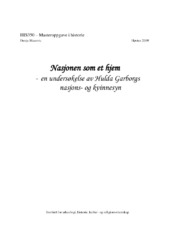Nasjonen som et hjem - en undersøkelse av Hulda Garborgs nasjons- og kvinnesyn
Master thesis
Permanent lenke
https://hdl.handle.net/1956/3792Utgivelsesdato
2009-12-07Metadata
Vis full innførselSammendrag
The aim of this master thesis has been to explore and discuss in what way we can use specific paradoxes created by a historical person‟s writings to understand more about the general paradoxes of the period/ society in which that person lived. To do so, I have chosen the works of the Norwegian nationalist and difference feminist Hulda Garborg (1862-1934), to trace the different discourses that shaped her contradictory and ambiguous theories about the Norwegian nation and women‟s roles within the nation. More specific, the aim of this thesis has been to discuss how Hulda Garborg could contribute to and influence the nationalist discourses in which she was imbedded by creating her own statements about the nature of the Norwegian nation. Using her books on home management, folk costumes, folk dances and on women‟s position in the society, I have claimed that the paradoxes in her theories were expressed in contradictions caused by the inter mingling of a modernisation discourse and a nationalist discourse. While the modernist discourse was characterised by belief in progress and science as absolute goods and means in the improvement and education of the general public about the importance of scientifically based improvement of their lives, the nationalist discourse was based on the importance of going back to the Norwegian nation‟s roots through revival and practice of the old Norwegian culture as it was preserved in the peasant‟s culture. The focus on discursive creation is reflected in my definitions of the terms „gender‟ and „nation‟. In this thesis I have used Eric Hobsbawm‟s definition of the nation as an invented tradition, stressing the need to see this phenomenon as historically constructed and belonging to a specific period in European history. The creative perspective has also influenced my choice of Joan W. Scott‟s definition of gender as a constitutive element of social relationships based on perceived differences between the sexes and a primary way of signifying relationships of power. With a starting point in these two definitions, I have gone on to describe Hulda Garborg in the same way that Scott described nineteenth century French Feminists, as a historical actor caught in an internal paradox defined by her wish to create a nation that went forwards by going backwards. Taking the word „millombrøyte‟ from her husband and writer Arne Garborg to designate the feeling of being caught between one‟s past and one‟s future, I‟ve tried to discuss how the inter mingling of the two discourses mentioned above has created a body of work full of contradictions and how it can be used as a fruitful starting point in an examination of the limits of what historical actors situated within a discourse can or can‟t say about their subjects.
Utgiver
The University of BergenOpphavsrett
Copyright the author. All rights reservedThe author
